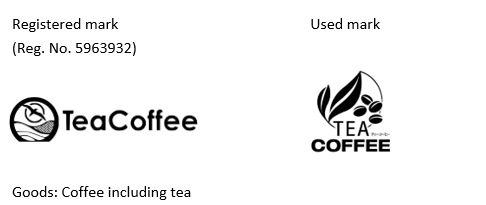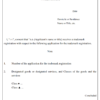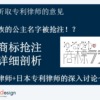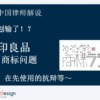2019.02.04
Vol.14 (SALT SUGAR)
AppealNo. 2017-7934
Subject mark
塩砂糖
※This can be translated as “salt sugar”
Class 30
Sugar, etc.
Conclusion
The subject mark should be registered in terms of distinctiveness
Summary
At the examination stage, the distinctiveness of the subject mark was denied because the word “○○(調味料)砂糖” corresponding to “sugar + XXX (a seasoning)” is used as the meaning “sugar + XXX (a seasoning)”, and the goods “sweeteners using salt and sugar” are manufactured and sold under the word “塩砂糖” corresponding to “salt sugar”.
The Appeal Examiners reversed the above examiner’s decision indicating that it is difficult to recognize a specific meaning from the subject mark and that there is no fact where the word “塩砂糖” is generally used to indicate a specific feature of goods.
My comments
One of the reasons why the present mark has distinctiveness is the word “塩砂糖” is not generally used to indicate a specific feature of goods. However, this reason is no longer criteria for having distinctiveness by the revision of the trademark examination guidelines, which have applied to examinations since January 30, 2019 (the present decision was issued before this revision). Therefore, currently, the most important criteria for judgement is whether consumers generally recognize the feature of goods from a mark.
The mark comprising two generic names can be judged to lack distinctiveness as in this case. There is an infringement dispute regarding such a mark in court. Although the details of the dispute are not clear because the suit is in progress, the following is likely to be the summary of the dispute according to some news articles.

If the word part has distinctiveness, these marks can be similar to each other. I believe that the word part “Tea Coffee” has no distinctiveness for the following reasons.
(1) It is common to mix multiple sort of drinks, especially for coffee and tea (e.g. coffee late, soy late, lemon tea, soy tea, etc.
(2) The drink comprising tea and coffee exist actually
(3) There is no obstructive factor for mixing tea and coffee
Unlike this case, the subject mark “塩砂糖” should have distinctiveness as judged in the JPO’s Appeal for the following reasons.
(a) The goods made from mix of multiple sort of seasonings are unusual (Especially, the goods made from mix of salt and sugar)
(b) There is obstructive factor for mixing salt and sugar, that is, since seasonings are used based on recipes showing how much each seasoning should be used, a mixed seasoning does not make it possible to measure each of seasonings. Especially, salt and sugar have completely different types of tastes, and thus the mixed one is not easy to use, unlike the mixed salt and pepper.
Nevertheless, if the seasoning (sweeteners) made from mix of salt and sugar became common in the future, there would be a possibility of the present mark getting to lack distinctiveness.
CATEGORY
NEW ENTRY





